Untangling the knots: collaborative efforts in a small-scale shark fishery through grass root dialogues, workshops, and a national shark and ray symposium
Workshop of small-scale shark fisheries in Indonesia, will it be sustainable?
Discussing small-scale shark fisheries in Indonesia is a never-ending topic. Sharks play a crucial role in the ecosystem from an ecological perspective and become a source of livelihood for many coastal communities. Unfortunately, the generalisation of negative stigma has become a challenge for fishermen whose alternative livelihoods are limited. This situation is exacerbated by the lack of scientific data related to biological and ecological aspects of sharks or socio-economic factors, which are crucial in determining policy direction.
Save Our Seas Foundation allows us to understand the small-scale shark fisheries in Sangihe and many places in Indonesia. On 26th March 2024, we organised a workshop titled “Small-scale shark fisheries in Indonesia, will it be sustainable?” in collaboration with the Ministry of Marine and Fisheries (MMAF), the Faculty of Fisheries and Marine Sciences (FPIK) at IPB, and the Faculty of Biology at UGM, with full support from the National Research and Innovation Agency (BRIN), the Coastal and Marine Resource Management Agency (BPSPL) Makassar, WWF Indonesia, Thresher Shark Indonesia, Mobula Project Indonesia, Elasmobranch Project Indonesia, and the Rekam Nusantara Foundation.
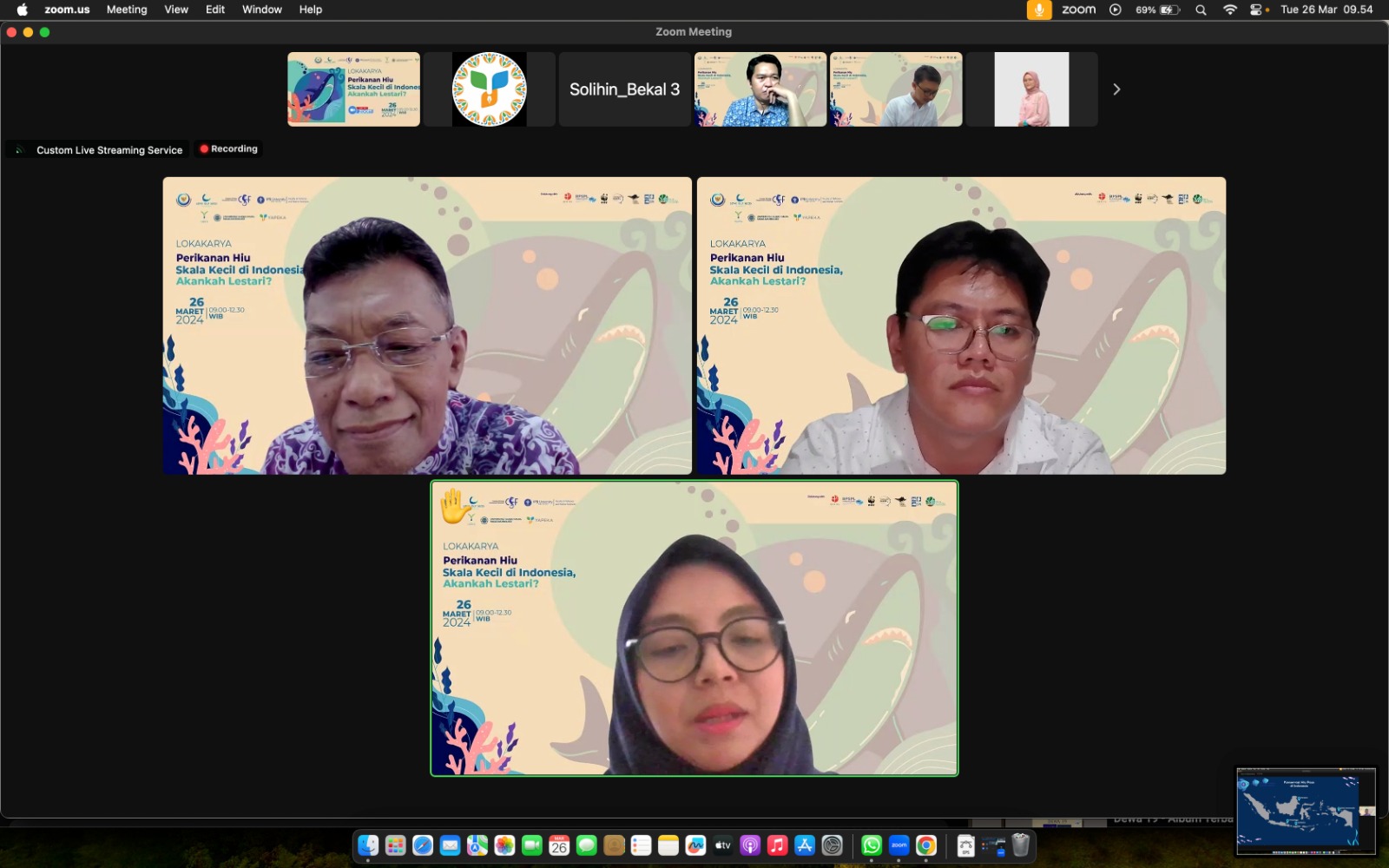
Discussions with experts on how to develop shark tourism during the workshop. Photo © Citra Septiani and Akbar Reza
The main session, moderated by Heri (Independent Fisheries Consultant/Leader Preparation), featured Prof. Ir. Fredinan Yulianda (FPIK IPB University) emphasised the importance of adaptive management in his presentation on “Conservation challenges and management status”. Similarly, Dr. Fahmi (BRIN) discussed the “Global conservation status of shark species ” highlighting the need for effective use of energy to regulate shark fisheries, for example, by strictly monitoring businesses. Representing BPSPL Makassar, Permana Yudiarso, S.T., M.T. stressed ongoing regulations such as quotas, size regulations, reporting, and licensing updates related to species included in Appendix II in his presentation on “Conservation implementation of shark resources in Sangihe Islands Regency”, including hopes for collaboration among various parties.
Citra Septiani, M.Res (YAPEKA) then presented data on shark fisheries’ ecological and socio-economic aspects in Batuwingkung, Sangihe, including potential future development alternatives to other business models. Dr. Alin Halimatussadiah (Head of the Environmental Economic Research Study Group FEB UI) responded to the data by discussing the process of livelihood switching for fishermen in an economic context involving a long and collaborative process.
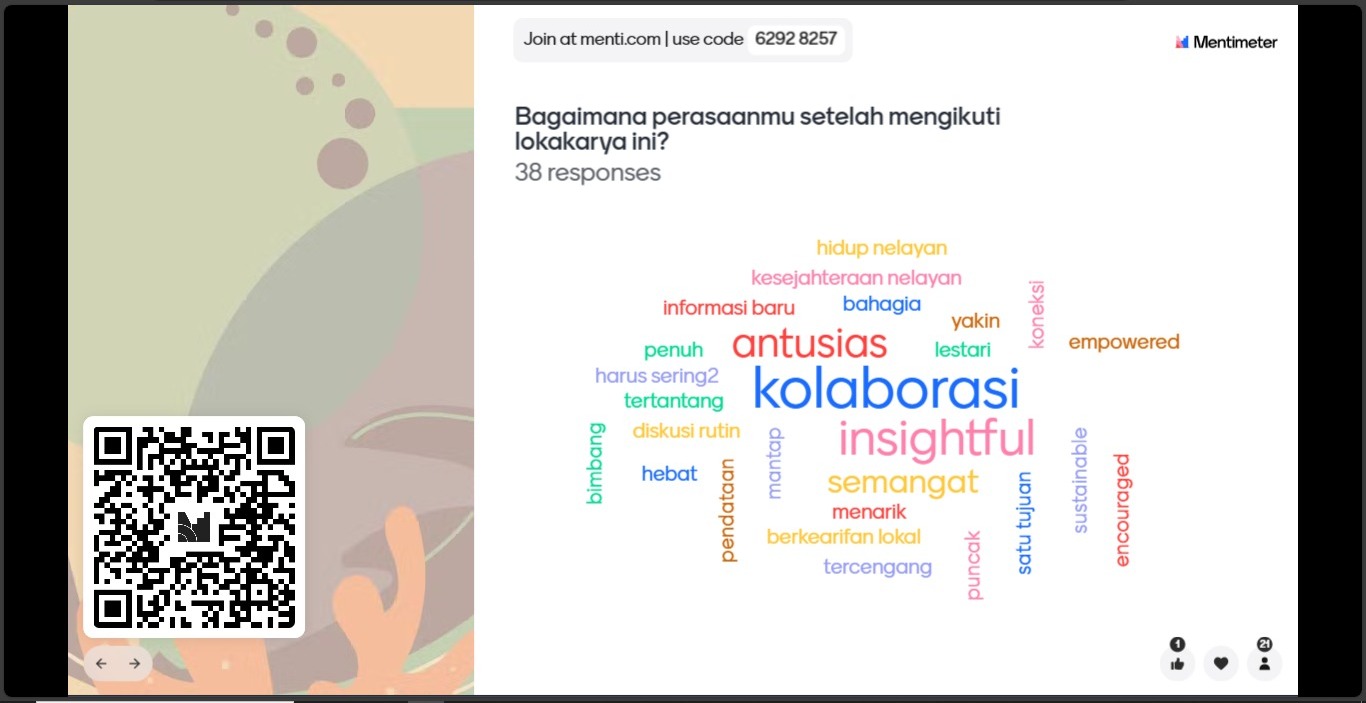
“Collaboration, Insightful, and Enthusiast” were the workshop participants feelings after joining the workshop. Photo © Citra Septiani and Akbar Reza
Collaborative efforts in Small-scale Shark Fishery through Grassroots Dialogues
Then, on 4th May 2024, a Grassroot Dialogue in Tahuna, Sangihe Islands, was held by gathering the local stakeholders, government, shark fishers, and traders. During the meeting, we discussed the local perspective and local efforts for shark conservation and management. We also invited the local traders and shark fishers to explain their perspective on the existing regulations and the management effort to conserve the shark. The change in national and international regulation for shark trades will influence the local fishers income; therefore, there should be a collaboration between the government and communities to develop the alternative income. Hence the pressure on the shark population will decrease over the time.
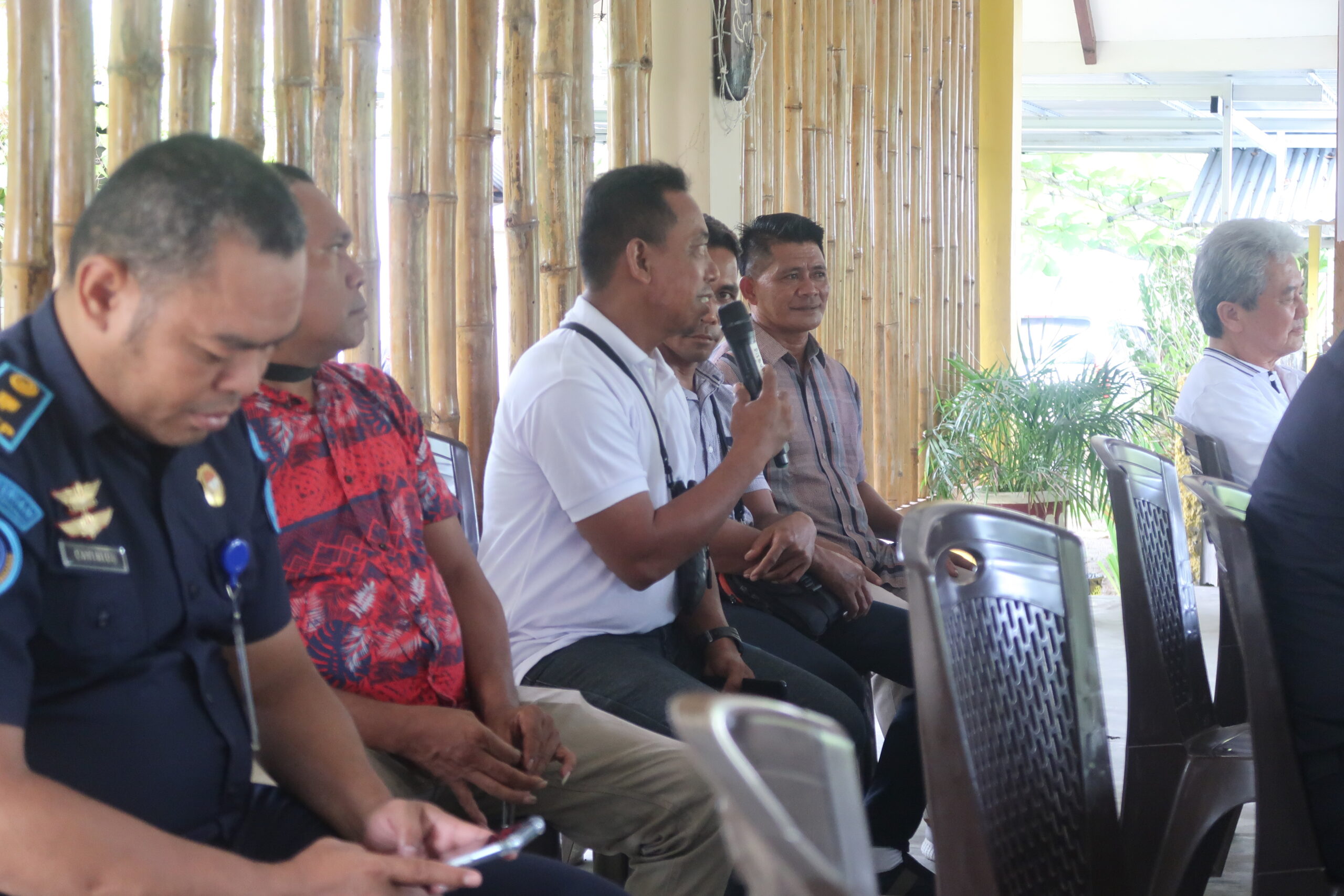
Shark Fisher explains the importance of the stakeholder's concern on how to increase the alternative livelihood to reduce the pressure on the shark population. Photo © Faisal Umar | YAPEKA
National Shark and Rays Symposium
We also share our works in the national-level symposium on the 21st and 22nd of May, 2024. The agenda was coordinated by the MMAF, in collaboration with Konservasi Indonesia, Yayasan WWF, USAID-Kolektif, Yayasan Kehati, Konservasi Alam Nusantara, and Universitas Indonesia. More than 100 participants share their work from fundamental ecological research, technological innovation, conservation, and human dimensions. Not only sharing the works, but the schedule also encourages participants to discuss future collaboration.
During the symposium, we had a fruitful discussion with several NGOs working on similar topics, particularly long-term baseline data for evidence-based policy and alternative livelihood studies, such as Thresher Shark Indonesia. We also discussed potential data support for Konservasi Indonesia, which is currently building an ArcGIS-based national database for shark landing. The symposium ends by synthesising all the works into policy recommendations.
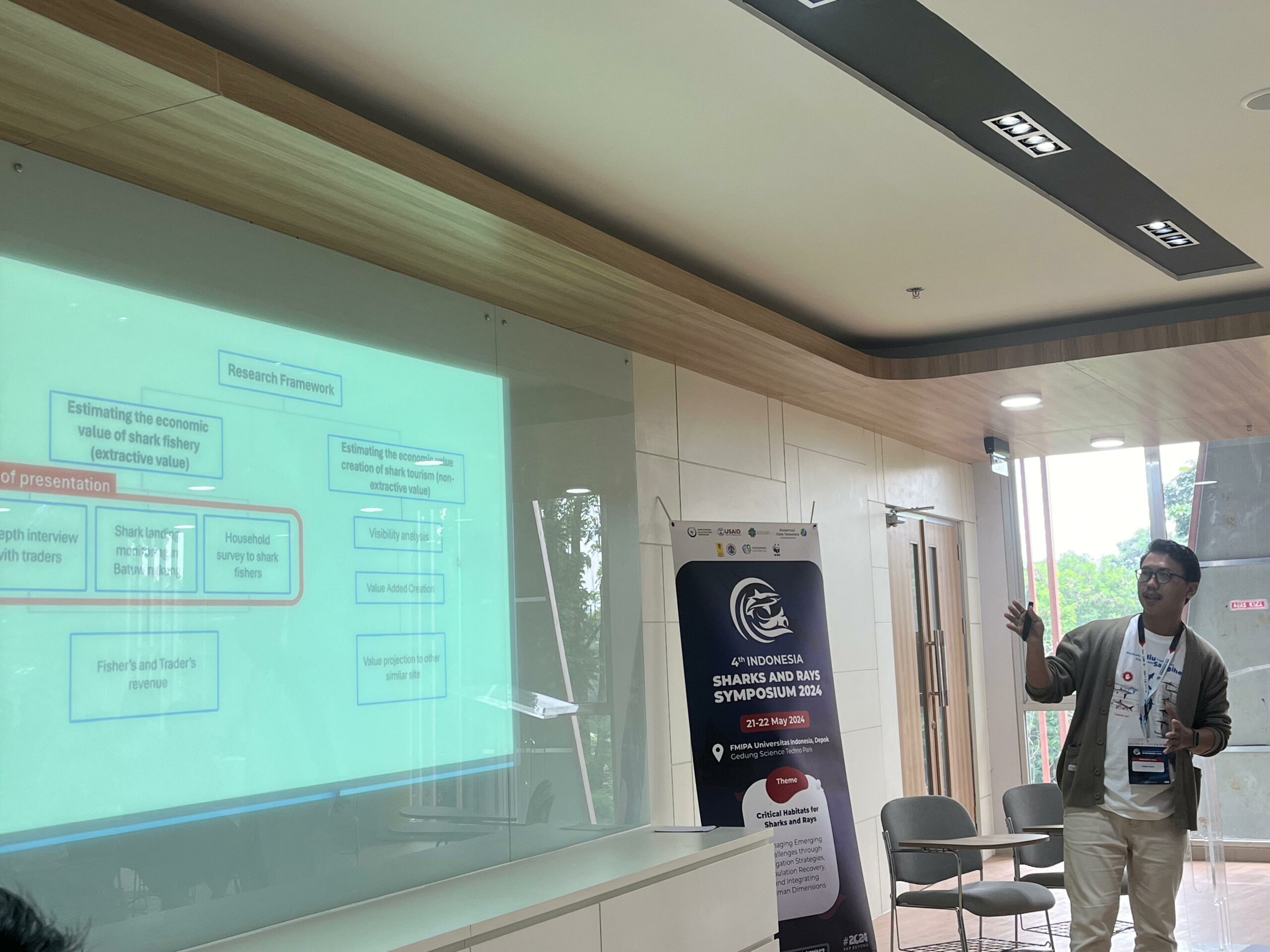
Our researcher Akbar Reza, Lecturer from Faculty of Biology Universitas Gadjah Mada is presenting “Status and structure of shark populations in small-scale shark fisheries in Batuwingkung Village, Sangihe Islands. Photo © Elisabeth Astari | YAPEKA
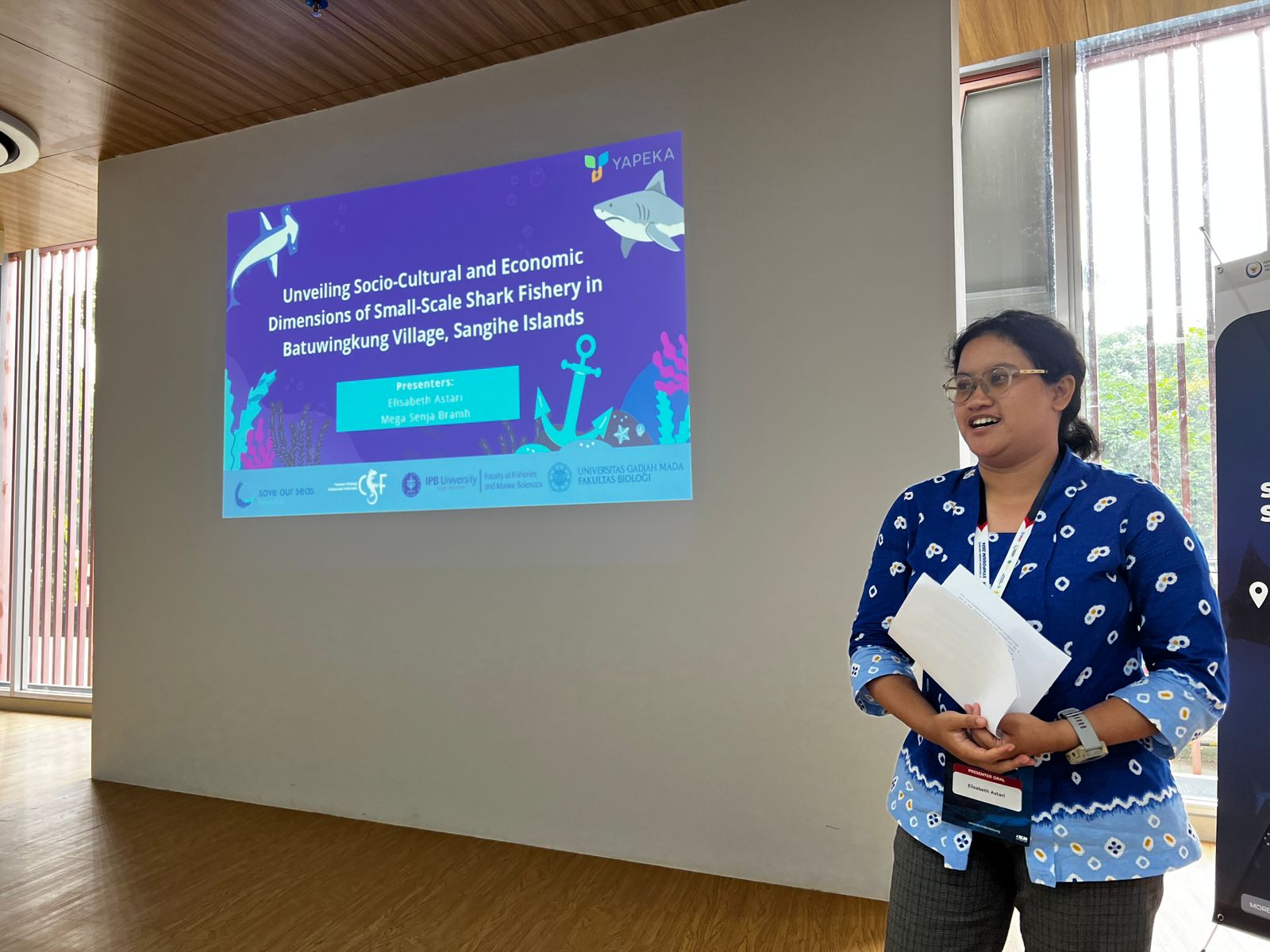
Our researcher, Elisabeth Astari, presenting the research on “Unveiling socio-cultural and economic dimensions of Small-scale shark fishery in Batuwingkung Village, Sangihe Islands. Photo © Akbar Reza | YAPEKA
